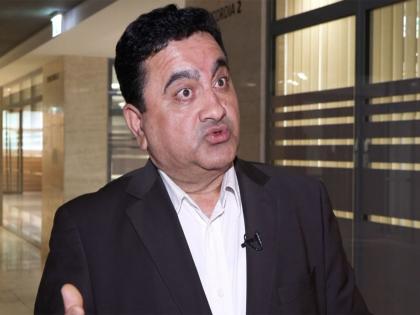Pakistan's hidden occupation: PoGB left voiceless under Islamabad's control
By ANI | Updated: October 9, 2025 14:40 IST2025-10-09T14:37:48+5:302025-10-09T14:40:04+5:30
Geneva [Switzerland] October 9 : On the sidelines of the 60th session of the United Nations Human Rights Council ...

Pakistan's hidden occupation: PoGB left voiceless under Islamabad's control
Geneva [Switzerland] October 9 : On the sidelines of the 60th session of the United Nations Human Rights Council (UNHRC), in an exclusive interview with ANI, political activist from Pakistan-occupied Gilgit Baltistan (PoGB), Sherbaz Khan has accused Pakistan of exploiting the region's disputed status while denying its people constitutional rights, representation, and control over their own land and resources.
Sherbaz Khan described PoGB as a "disputed territory under United Nations resolutions", asserting that Pakistan's continued interference violates both international law and basic human rights. "When you are not constitutionally part of a country, you cannot be taxed or ruled as one," he stated.
Khan criticised Pakistan for imposing heavy taxation despite the Supreme Court's 1999 ruling prohibiting such measures in PoGB without parliamentary representation. "Without representation, there can be no taxation," he reiterated, noting that Pakistan's National Logistics Cell (NLC) continues to collect taxes illegally at the Sost border.
He also condemned the Land Reforms Bill 2025, calling it a "draconian law" that enables Islamabad to sell local land and natural resources to outsiders under the pretext of "green initiatives." According to him, land, forests, and mineral-rich areas are being leased to national and international companies without local consent. "They call it development, but it's dispossession," he remarked.
Khan alleged that PoGB's legislative assembly is merely symbolic, functioning under direct orders from federal authorities. "A single bureaucrat from Islamabad dictates the entire system," he stated, adding that local representatives lack the authority to make independent decisions.
Highlighting the absence of basic infrastructure and disaster response mechanisms, Khan said residents often rebuild roads and water systems themselves after floods and landslides. "The government only issues statements; nothing changes on the ground," he stated. Calling for international attention, Sherbaz Khan urged the United Nations and global human rights organisations to intervene.
Disclaimer: This post has been auto-published from an agency feed without any modifications to the text and has not been reviewed by an editor
Open in app